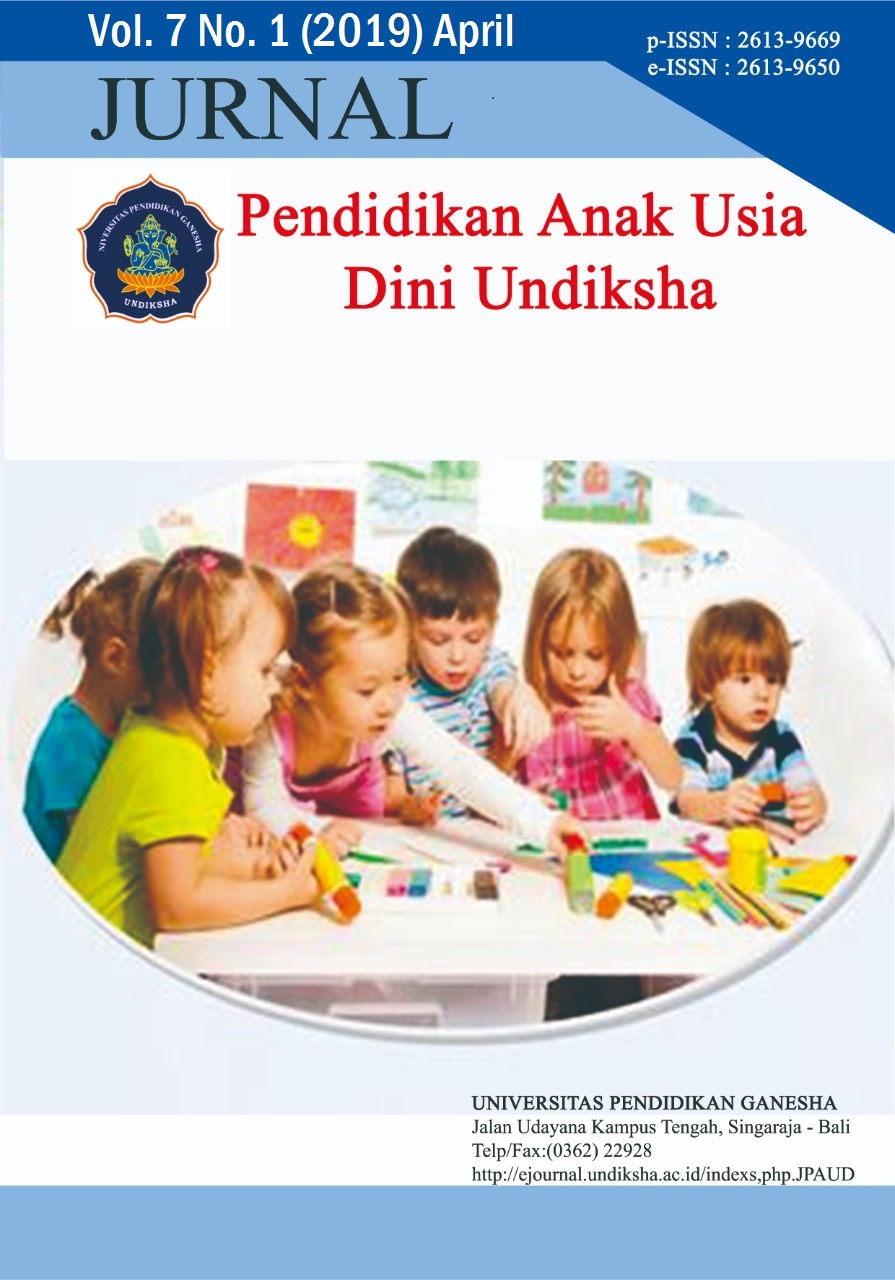Evaluasi Program PAUD Inklusi Di Kota Denpasar Ditinjau Dari Hasil Belajar dan Perencanaan Program Lanjutan
DOI:
https://doi.org/10.23887/paud.v7i1.18747Abstract
Penelitian ini bertujuan untuk mengetahui efektivitas hasil belajar dan perencanaan program lanjutan pada PAUD inklusi yang ditinjau dari aspek produk di Kota Denpasar.Penelitian ini merupakan jenis penelitian evaluatif. Jumlah populasi dalam penelitian ini adalah 13 sekolah PAUD inklusi yang terdata pada Dinas Pendidikan Kota Denpasar. Teknik Sampel yang dilakukan dalam penelitian ini adalah teknik porposive Sampling. Sampel penelitian sebanyak 13 sekolah dengan jumlah responden sebanyak 119 pendidik yang meliputi Kepala TK dan Guru Kelas. Data dikumpulkan melalui metode kuesioneryang sudah di uji validitasnya menggunakan uji validitas isi dan sudah di uji reliabilitasnya. Data dianalisis untuk mencari hasil akhir berupa nilai T-score yang nantinya didapatkan hasil berupa jumlah frekuensi positif (F+) dan frekuensi negatif (F─), selanjutnya dikonversikan melalui kuadran Glickman. Hasil penelitian menunjukkan (1) indikator ketercapaian peserta didik dalam sikap peserta didik F+ = 45,378% dan persentase F- = 54,622% menunjukkan hasil kurang efektif (2) indikator ketercapaian peserta didik dalam hasil belajar peserta didik persentase F+ = 34,454% dan persentase F- = 65,546% menunjukkan hasil kurang efektif. (3) indikator mengevaluasi hasil pembelajaran persentase F+ = 55,463% dan persentase F- = 44,537% menunjukkan hasil efektif (4) indikator perencanaan kembali suatu program presentase F+ = 44,537% dan presentase F- = 55,462% menunjukkan hasil kurang efektif. Berdasarkan hasil penelitian dapat disimpulkan bahwa evaluasi program PAUD inklusi ditinjau dari hasil belajar dan perencanaan program lanjutan di kota Denpasar menunjukkan hasil kurang efektifI (- - + - )Kata Kunci : Evaluasi Program, Hasil Belajar, Perencanaan Program Lanjutan, PAUD Inklusi
This study aims to determine the effectiveness of learning outcomes and advanced program planning in inclusion ECD which is reviewed from the aspect of products in the city of Denpasar. This study is a type of evaluative research. The population in this study were 13 inclusion PAUD schools that were recorded at the Denpasar City Education Office. The sample technique used in this research is porposive sampling technique. The study sample consisted of 13 schools with a total of 119 educators including the Head of Kindergarten and Class Teachers. Data collected through questionnaire methods that have been tested for validity using the content validity test and have been tested for reliability. Data were analyzed to find the final results in the form of T-score values which later obtained results in the form of a number of positive frequencies (F +) and negative frequencies (F─), then converted through Glickman's quadrant. The results showed (1) the indicators of student achievement in the attitude of students F + = 45.378% and the percentage F- = 54.622% showed less effective results (2) indicators of student achievement in student learning outcomes percentage F + = 34.454% and percentage F- = 65,546% showed less effective results. (3) indicators evaluating learning outcomes percentage F + = 55.463% and percentage F- = 44.537% showing effective results (4) planning indicators for returning a program percentage F + = 44.537% and percentage F- = 55.462% showing less effective results. Based on the results of the study it can be concluded that the evaluation of PAUD inclusion programs in terms of learning outcomes and advanced program planning in the city of Denpasar showed less effective results (- - + -)
keyword : Program Evaluation, Learning Outcomes, Advanced Program Planning, PAUD Inclusive
Downloads
Published
2019-07-21
How to Cite
., N. M. L. A., ., L. A. T. S., & ., D. I. B. G. S. A. S. (2019). Evaluasi Program PAUD Inklusi Di Kota Denpasar Ditinjau Dari Hasil Belajar dan Perencanaan Program Lanjutan . Jurnal Pendidikan Anak Usia Dini Undiksha, 7(1), 57–67. https://doi.org/10.23887/paud.v7i1.18747
Issue
Section
Articles
License
Authors who publish with the Jurnal Pendidikan Anak Usia Dini Undiksha agree to the following terms:
- Authors retain copyright and grant the journal the right of first publication with the work simultaneously licensed under a Creative Commons Attribution License (CC BY-SA 4.0) that allows others to share the work with an acknowledgment of the work's authorship and initial publication in this journal.
- Authors are able to enter into separate, additional contractual arrangements for the non-exclusive distribution of the journal's published version of the work (e.g., post it to an institutional repository or publish it in a book), with an acknowledgment of its initial publication in this journal.
- Authors are permitted and encouraged to post their work online (e.g., in institutional repositories or on their website) prior to and during the submission process, as it can lead to productive exchanges, as well as earlier and greater citation of published work. (See The Effect of Open Access)











